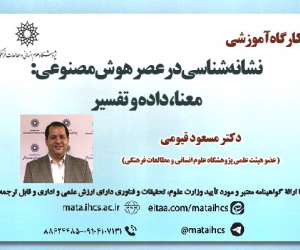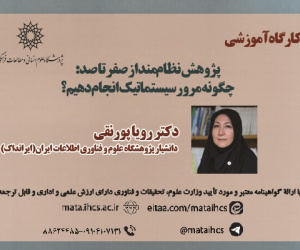مبانی حق بر هنر و وظایف دولت در برابر آن از منظر شریعت اسلامی
آرشیو
چکیده
هنر یک حق مسلم در زمره حقوق شهروندی و حقوق بشر است. فوائد و آثار هنر آنقدر مهم و چشمگیر است که هیچ حکومتی نمی تواند بدان بی توجه بوده و خود و شهروندانش را از آن محروم و بی نصیب گرداند. شریعت اسلامی آموزه ها و ملاحظات ارزشمندی در خصوص هنر دارد و حق بر هنر را می توان از آن استفاده کرد و در پی آن وظایف و تعهدات حکومت اسلامی نیز در تأمین و حمایت از این حق استنباط نمود. حکومت اسلامی باید زمینه های بهره مندی و حمایت از این حق را برای شهروندان به شایستگی فراهم آورده و ضمن جهت دهی مطلوب آن، از انحراف و آسیب های آن هم مراقبت نماید. در این نوشتار تلاش شده ضمن بیان مبانی حق هنر، مهم ترین وظایف و تکالیف حکومت اسلامی در این باره تبیین گردد. وظایفی چون: شناسایی حق بر هنر و حمایت ازآن، بهره گیری از هنر برای آموزش و تربیت، ارتقای سلامت روانی و معنوی در جامعه، و ترویج معارف و ارتقای فرهنگ دینی. همچنین حکومت اسلامی موظف است حمایت های لازم را برای برخورداری شهروندان محروم و کم توان از حق هنر با توجه به نیاز و استعدادشان فراهم نماید و افزون بر این ها حمایت های مناسب را برای خلق و ارائه آثار هنری مطلوب، منظور کرده و در برابر تدابیر و اقدامات مناسب را برای جلوگیری از نفوذ و ترویج هنرهای منحرف و زیان بار و رفع آسیب های ناشی از آن انجام دهد. با این ترتیب می توان اذعان نمود که حکمرانی اسلامی در هنر دارای نظامی شایسته و کامل است.The Foundations of the Right to Art and the Duties of the State Toward It from the Perspective of Islamic Sharia
Art is an inherent right within the framework of civil and human rights. Its benefits and impacts are so significant that no government can afford to ignore it, thereby depriving itself and its citizens of its value. Islamic Sharia provides valuable teachings and considerations regarding art, from which the right to art can be derived. Consequently, the duties and obligations of an Islamic government in securing and protecting this right can also be inferred. The Islamic government must adequately facilitate the means for citizens to benefit from this right, guiding it appropriately while safeguarding against its potential deviations and harms. This article seeks to establish the foundations of the right to art and elucidate the most important duties of an Islamic government in this regard. These duties include recognizing and protecting the right to art, utilizing art for education and moral development, enhancing psychological and spiritual well-being in society, and promoting religious knowledge and culture. Additionally, the Islamic government is obligated to provide necessary support for underprivileged and disadvantaged citizens to access this right in accordance with their needs and talents. Furthermore, it must extend appropriate support for the creation and presentation of commendable artistic works while implementing suitable measures to prevent the infiltration and spread of deviant and harmful art, as well as mitigating its negative consequences. Thus, it can be affirmed that Islamic governance in art constitutes a worthy and comprehensive system.







